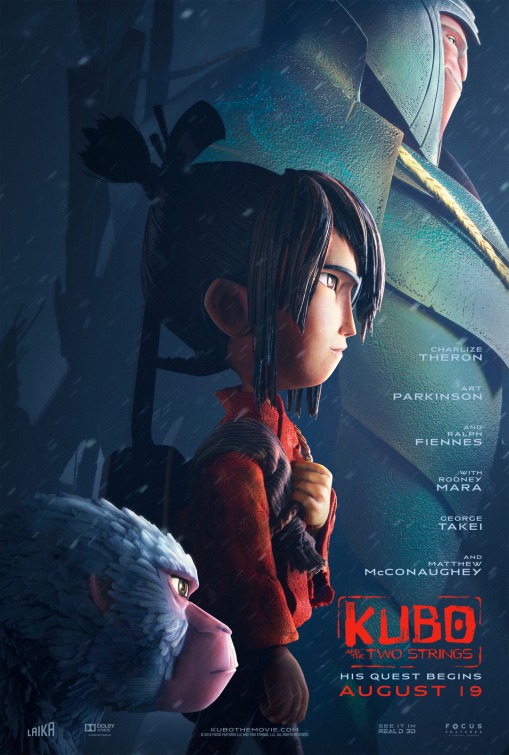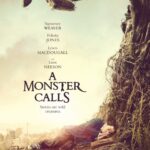
Be Bold. Be Brave. Be Epic.
Director
Travis Knight
Starring
Art Parkinson
Charlize Theron
Matthew McConaughey
Rooney Mara
Ralph Fiennes
Set in ancient Japan, the film opens slowly revealing the backstory of our lead, Kubo [Parkinson], a young one-eyed boy living in a cave with his ill mother. By day Kubo sets out to the local village and entertains them with origami brought to life with his shamisen guitar. Each day he ventures to the town alone and gets back before the sun sets. It’s only then that his grief-stricken mother comes out of her weak, almost comatose state and tells him stories of his deceased father’s heroism. But owing to her illness and a head injury suffered when Kubo was a baby, his mother has difficulty finishing said tales or recalling certain information. Learning the village has a festival where the populace light lanterns to commune with the dead, Kubo sets out to speak with his father, Hanzo. Distracted and frustrated by his lack of progress, Kubo inadvertently stays out after sunset and is immediately set upon by his mystical aunts [Mara], acting on their father, the Moon King’s [Fiennes] decree to capture Kubo in order to steal his remaining eye. Events transpire and Kubo must seek out three magical items with the help of a monkey charm brought to life [Theron] and a cursed samurai who is living as a human-beetle hybrid [McConaughey].
Anyone who has seen the previous releases from Laika will know that the production company really hasn’t put a foot wrong. Each animated story is intelligent, inspiring, funny in places and thoroughly entertaining. As far as the mainstream is concerned, they are one of the only animation studios that are producing vibrantly unique and really mature storytelling without pandering to intended audiences. Don’t get me wrong, Pixar are still the dominant leaders in broadly welcomed films of this nature (one only has to look at the maturity and originality in Inside Out to see that) but Laika’s movies deal with narrative settings and concepts that almost invites people specifically open to unusual or offbeat tales, over the average cinemagoer. While this could be construed as elitism against audiences, I see it more as an example of exceptionalism when compared to its competition; offering stories, characters and universes hitherto unseen in most family films.
One of Kubo And The Two String’s greatest strengths is that it doesn’t insult the audience’s intelligence. What we have here is a wonderful fantasy story that emulates legends and folk tales by not getting bogged down in exposition or overly explaining the magical elements. We don’t need to know the intricacies of Kubo’s powers or exactly who the Moon King is any more than a child needs to understand where Merlin’s powers derive from or the lady of the lake’s backstory before bestowing Excalibur to King Arthur; the moral and the drive are more important and this film excels when dealing with these elements. What’s more, it doesn’t automatically oblige to an audience’s happiness; too many films mistake satisfaction with joy and offer happy resolves every five minutes in case viewers inadvertently feel something other than utter positivity – “I didn’t like the film because it made me feel sad and I don’t go to the movies to feel sad.” When thinking about this release, I keep coming back to the word mature because everything in this film is very maturely handled; the tone is extremely dark at times, the themes of family, memory, duty, honour and bravery are explored without excessive romanticism, the use of pop culture references are completely absent and most satisfyingly, there isn’t a single fart, burp or toilet joke (unless you count projectile chicken egg birthing). To expand on that last point a little more (not the chicken bit), I appreciate a well-timed, well-delivered crude joke more than most but in family film’s it’s just a cheap laugh and there are so few executions which rise above that label. Case in point, I’ve seen the exact same gag, wherein a character gets scared and comically shits themselves so many times in the last year – it’s in the trailer for Trolls twice! It’s simple, dumb and always a side gag that serves to illicit a forced guffaw in a presumably lacklustre scene. So to find a film that families will watch that doesn’t resort to the easy sell is an extremely welcome treat.
One of the main draws for this film is the outstanding technical achievement. I know it’s stop motion, the end credits confirm as much and I’ve seen a few behind-the-scenes timelapses but I’m still blown away by how certain things have been accomplished. From the character motion and evocative performances to the sprawling sets and bold camera movements, it’s hard for your mind to accept that this is essentially a series of still images sewn together like a flip book. This usually leads to a lot of CGI bashing and bemoaning the industry for favouring it so heavily (partly justified) but even this film uses several computer generated composites to make certain background elements work, so I’ll refrain combating the opponent to praise your candidate. I think the difference is that any art form at the peak of its power can create truly spellbinding imagery and the beauty and detail on display here really does sell the medium and highlight its merit and future employment. Of course, the animation alone doesn’t ensure the film’s connection with an audience, it merely captivates them visually. It’s through the work of the sound design, score and voice actors that we get attached to these characters; thankfully, Dario Marianelli’s engrossing score and an extremely talented (albeit surprising choices) set of voice actors ensure just that.
However, this movie is far from perfect. While I was very entertained and would happily praise the bold style and narrative choices, a lot of people are going to see this film as inaccessible or cryptic. Personally, I love the idea behind why Kubo has only one eye but other viewers may find the intangible notion confusing or unsatisfying. What’s more the conclusion feels a touch rushed and one could argue the narrative is kinda formulaic and predictable but as the story is mirroring the form and content of myth and legends, you’re going to get a lot of standard heroic tropes, the trick is making sure the execution is original or pleasing enough that audiences won’t notice too much. In truth, most of what could annoy or ostracise people can be linked back to the trappings of folk tales and then you have to question whether this is the fault of the film or anything attempting to imitate these types of stories.
If you’re looking for something different to the standard fare and don’t mind being freaked-the-fuck-out by some pretty creepy imagery, Kubo And The Two String’s touching and heartwarming tale is the film for you.
Release Date:
9th September 2016
The Scene To Look Out For:
**Story-ruining spoilers within**
Monkey and Beetle having an argument while Kubo wonders off and builds a boat. So I worked out the twist fairly quickly. Clues are left in the dialogue that gives you a sort of heads-up about where certain character development is going. The fact that Hanzo is never depicted through flashback means that he either isn’t dead or he’s a villain or there’s some deeper aspect to his character – because film loves to show these random cutaways and any time it doesn’t, it’s saving it for a reason. But what worked really nicely is that the reveal doesn’t come as a shock. Sure, amnesia is a really shitty, weak device but its use is completely justified and elevated as more than just a set-up for a twist. At the start of the film Kubo asks his mother to describe what his father was like, outside of the stories she tells, what he was like as a person. Later, as Beetle and Monkey start to form a closer bond, it becomes subtly evident that a relatable family unit starts to form and while it could easily have developed into little more than a projected unity, the fact that the audience starts to work out the dynamic thanks to the interactions is a really nice touch.
Notable Characters:
Every character is great. The supports are very two dimensional and really only serve the story as ‘the scared townsfolk’ but they have enough personality that they’re not completely dismissible. As far as aesthetic and performance goes, I really like Rooney Mara’s dual performance as Kubo’s nameless twin aunts. Ethereal, malicious, scary and brought to life through haunting voice work, they are a compelling, relentless concept for henchman-level villains.
Highlighted Quote:
“First question. If I’m Beetle and you’re Monkey.. why isn’t he called Boy?”
In A Few Words:
“Exquisite imagery and design paired with a fun, thrilling adventure tale that rises above the norm; just what you’d expect from Laika”
Total Score: 5/5
![The Red Right Hand Movie Reviews [Matthew Stogdon]](https://reviews.theredrighthand.co.uk/wp-content/uploads/2021/12/cropped-header1.png)



